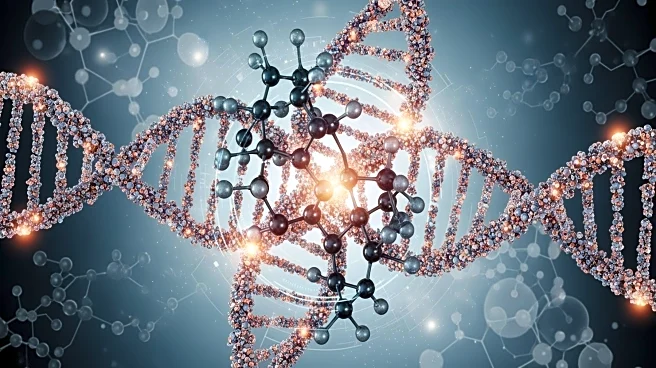What's Happening?
Recent advancements in protein sequencing have been significantly enhanced by AI-driven methods, as reported in a recent publication. These methods include the development of structure-aware protein language
models via contrastive learning, which improve the prediction of protein-protein interactions. Additionally, AI is being utilized to accelerate the search for new antibiotics and medicines by analyzing large chemical compound libraries. This approach is part of a broader trend in drug discovery, where AI is used to streamline the process of identifying potential therapeutic compounds from vast chemical libraries. The AI model, known as DrugReflector, was trained on data from nearly 9,600 chemical compounds and has shown to be significantly more effective than traditional methods.
Why It's Important?
The integration of AI in protein sequencing and drug discovery represents a significant leap forward in the pharmaceutical industry. By enhancing the efficiency of drug discovery, AI can potentially reduce the time and cost associated with bringing new drugs to market. This is particularly crucial in the development of treatments for complex diseases, where traditional methods may be too slow or costly. The ability of AI to predict protein interactions and identify promising compounds more effectively could lead to breakthroughs in treating conditions that currently lack effective therapies. This advancement not only benefits pharmaceutical companies by streamlining research and development but also holds promise for patients awaiting new treatments.
What's Next?
As AI continues to prove its value in drug discovery, it is likely that more pharmaceutical companies will adopt these technologies to enhance their research capabilities. The success of models like DrugReflector could lead to further investment in AI-driven research and development, potentially accelerating the discovery of new drugs. Additionally, regulatory bodies may need to adapt to these technological advancements, ensuring that AI-driven discoveries meet safety and efficacy standards. The collaboration between AI researchers and pharmaceutical companies is expected to deepen, fostering innovation and potentially leading to more personalized medicine approaches.
Beyond the Headlines
The use of AI in drug discovery also raises important ethical and legal considerations. As AI models become more integral to the development of new therapies, questions about data privacy, intellectual property, and the transparency of AI decision-making processes will need to be addressed. Furthermore, the reliance on AI could shift the landscape of pharmaceutical research, potentially reducing the need for traditional laboratory-based methods and altering the skill sets required for future researchers. These changes could have long-term implications for the workforce in the pharmaceutical industry and the way new drugs are developed and brought to market.











